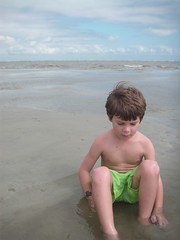
stunt kite, St Simon's Island
Juliet got wheedled into putting up her Christmas tree the day after Thanksgiving by her nieces. Yikes, says I. I just got the Halloween decorations back down the basement, I'm not ready to bring up xmas.
Gad, is anyone ever ready for Christmas? Oh now that's not right. I can clearly remember being very into it. When I was single and lived alone, actually.
Now, though, the thought of putting up lights in the cold, clearing out a corner for the damn tree, ornaments on and ornaments off, jeez I just don't need the extra hassle. In fact, I have for years been whining to Mr. Librarian about an artificial tree. Oooh, no mess! Oooh, just snap it together! Oooh!
To me, someone growing a tree so that they can cut it down and sell it to me so that I can put it in my living room and watch it slowly die seems absolutely absurd. Cut flowers, ok, they're pretty and don't take up much room in the garbage when they're done, but, like, a whole tree?
It's got to be bad for the environment too, all the resources in growing, shipping, and disposing - vs. the one-time cost of manufacturing an artificial tree. I made all these arguments to my husband. To further arm myself in case he proved intractable, I looked up the overall energy cost of real vs. artificial.
So guess what. Manufacturing an artificial tree out of PVC vinyl is like so environmentally heinous that you could deforest most of Montana, and, as long as you mulch your tree instead of putting it in the landfill, you'd be doing Mother Nature a favor.
Good thing I checked, huh? Good thing I had the skills, resources, and most of all inclination to look into something that seemed like a reasonable assertion before turning around and beating someone else over the head with it.
This is all I'm saying about the religion thing. I have had several penetrating conversations over the last few days about my atheism blog entry. I especially want to thank A the Niece and Friend Mary for being skeptical and tolerant and willing to civilly discuss what sounded like a big fat diatribe on my part.
In some ways, I am unmoved.
- I know that there are religious communities that actively discourage examination of received information, and I am against that.
- I know that there are religious communities that preach doctrine that is in direct opposition to fact. That makes me very uncomfortable, and sometimes hopping mad.
- I know that there are religious communities that condemn people who do not believe as they do, or who do things that they think is wrong, and god damn it, that condemnation is the exact opposite of what I know to be a major tenet of almost all world religions - tolerance.
Tolerance, to me, is the ultimate grace. It is the one word that summarizes the lessons one can draw from the stories of Jesus, Mohammed, Rama, Buddha - and you know, I call myself a religion retard but in fact I've read them all.
Intolerance is what kills people. I don't think I need to back that statement up.
On the other hand, I failed to state in my previous entry what has always kept me from decrying religion, and that is the (good) moral and spiritual guidance it can provide. Mary said it best when she pointed out, "My parents didn't send me to Catholic school so that I wouldn't be corrupted by people like you (paraphrase), they sent me to Catholic school to learn right from wrong."
Yeah, I still believe you get that from your parents more than from anyone else, but her Catholic education probably contextualized the specifics that she had absorbed at home, made it obvious that "Don't lie" wasn't just some preference of her mom's - "Don't lie" is a universal value.
Further, there is a lot to be said for the solace and comfort of ritual. And there are intrinsic goods: I know Buddhists who swear that the meditation involved has solved their anger issues.

And take it from me, you cannot study the history of the Western world without learning the history of the Catholic church and of Judaism.
In fact, I largely give the mainstream established faiths a pass. In the United States at least, Catholicism, Judaism, and the older Protestant sects have reached an equilibrium with the surrounding culture. They can accommodate dissenting views without feeling threatened, and, I would say, seem to place more of a priority on maintaining the well-being of their congregants (uh, with certain egregious exceptions) than on micromanaging their lives.
Those kids can grow up and go through a process of doubt and investigation and not feel like they're the first ones to ever wonder about such things.
It is, in the end, the ability of religion to subvert or suppress critical thinking that I take up arms against. It's not just religion that can do this - bad teachers and Dr. Laura play their part - but it kind of is just religion and parents that can start the process so damn early. A friend of Joe's is a middle school science teacher in rural Virginia, and has been told by his students that "our parents warned us about you" because he was known to teach evolutionary theory.
It seems like "good" religious education, promulgated by people who respect the child, allows for curiosity and exploration. But you take an incurious child, or a dogmatic or overzealous educator, and you end up with an adult who forwards email about underarm deodorant causing cancer or Jews planning the September 11th attacks.
Well, hell, Mary's right. You take the word "religious" out of the previous paragraph and it still reads true.
*Sigh*
So why am I unable to leave this alone? Because a child's mind is the epitome of potential. Just as we model good behaviors, we should model good habits of thought. We do that mind a disservice when we present statements of faith or dogma as irrefutable fact, without acknowledging alternative points of view or encouraging the child to evaluate those statements on her own.
I would propose two reasonable tests for statements that we make to children:
1. "Is it a (more or less) universally-held belief or value?"
2. "Is it provable?"
(A third test might be, "Is it useful to me at this moment?" which would allow such statements as "I'm sorry honey, the ice cream store is closed for the summer.")
Given these tests,
- Stealing is bad = universally held to be true
- Homosexuality is bad = not universally considered to be true
- The Earth orbits the sun = provable
- The Big Bang = not completely provable
- God created the world in 7 days = also not provable
Big Man is losing a tooth, and he's a bit squeamish about it. This is where the Tooth Fairy comes in, right? Promise a reward and the process of losing a tooth becomes less scary. I told the story. I said that when I was a little kid, my parents told me that if I put the tooth under my pillow yada yada fairy quarter etc.
Then I said, "What do you think about that?" He got this kind of incredulous smile and asked, "Is that true?" I told him I personally have never seen a fairy, but I was sure that there would be a present under his pillow in place of his tooth. "How do you think I know that?" I asked, and with another smile he answered, "Because you'll put it there!"
I find it very odd that in our civilization we're quite happy to speak of a Catholic child that is 4 years old or a Muslim child that is 4, when these children are much too young to know what they think about the cosmos, life and morality. We wouldn't dream of speaking of a Keynesian child or a Marxist child. And yet, for some reason we make a privileged exception of religion. And, by the way, I think it would also be [wrong] to talk about an atheist child. - Richard Dawkins

Eeep! I have been waiting for this blog entry since Monday night!
ReplyDeleteI am beginning to think the argument is not between believers like you and atheists like me, but rather between people like A's cousins and people like you and me.
ReplyDeleteThanks again. Things always get more interesting when Mary says, "I disagree"!